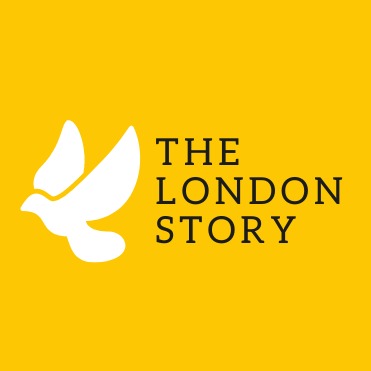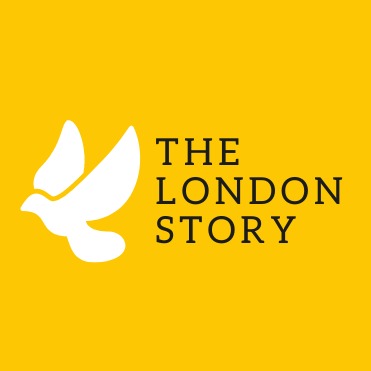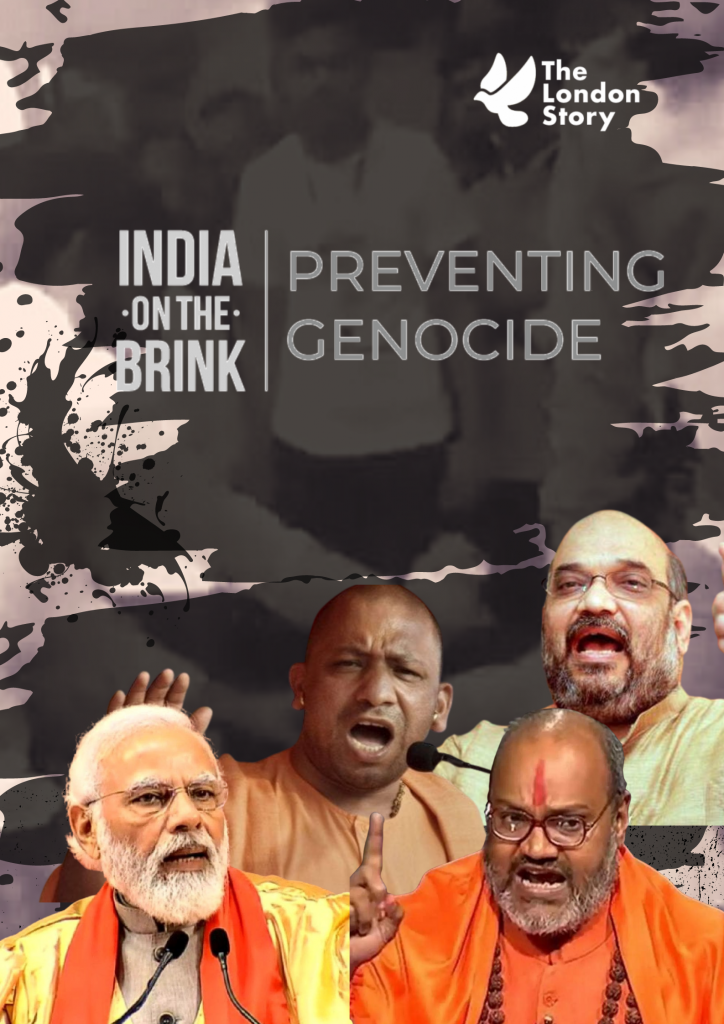The overwhelming consensus among the experts, academics and activists who spoke at the “India on the Brink” Summit that we at The London Story co-organized last month leaves no doubt: The process of genocide is underway in India.
Across three days, over 50 experts came together at the India on the Brink Summit to closely examine just how dangerous the mix of religious and political extremism is that comes together in the Hindutva (Hindu supremacist) movement. The conclusion: India’s political leadership is systematically discriminating against religious minorities, and ignoring or even condoning open calls for the mass murder of minorities by Hindutva leaders.
Hindu Supremacy and Exclusion by Law
Under India’s Prime Minister Modi, who is a member of the Hindutva Rashtriya Swayamsevak Sangh (RSS) whose founders explicitly drew inspiration from Nazism, several laws have been passed aimed at excluding specifically Muslims, Christians and other minorities from Indian society, for instances through the Citizenship Amendment Act, which adds a religious criterion to citizenship. Additionally, Muslims in the North-Eastern state of Assam are being designated “foreigners” on arbitrary grounds as part of the National Register of Citizens process, and observers are expressing grave concern over “codified Islamophobia”. India’s legal system also systematically discriminates against victims of hate crimes by reversing the burden of proof and prosecuting the victims of hate crimes as if they were the aggressor. Especially the vague definition of terrorism found in the widely criticized Unlawful Activities (Prevention) Act has been used to criminalize activists, and frame especially those from minority communities as enemies of the nation.
Surge in Hate Speech and Impunity for Incitement to Genocide
After years of simmering tensions and systematic discrimination, extremist Hindutva leaders are now openly calling on their followers to “defend” themselves and to rape and exterminate minorities. Such videos are freely circulating on social media, and their effects have materialized as real-life violence on many occasions. In light of this, the attendees of the India on the Brink Summit last month unanimously agreed that these are warning signs that genocide is unfolding.
Genocide, as per the Genocide Convention, refers to acts committed with intent to destroy, in whole or in part, a national, ethnical, racial or religious group. The Indian Government has a duty to take action immediately, as acts that are to be prohibited under the Genocide Convention include even “direct and public incitement to commit genocide”. While India has ratified the Convention, Modi and his government have turned a blind eye to international calls to fulfil their obligations.
One of the most prominent examples of impunity is the lack of action on Hindutva leader Yati Narsinghanand’s calls for the extermination of India’s Muslim population in a video that went viral and was seen over 42 million times on Facebook. At The London Story, we have been closely following his case as we projected his speech on the wall of the International Court of Justice in The Hague followed by a petition calling for his arrest. While the Indian judiciary did eventually arrest and charge him with hate speech, he was granted bail only days after. This leniency is just one of many examples that epitomize the way in which the Indian State gives a carte blanche to the most serious cases of incitement to commit genocidal acts.
Human rights expert Meetali Jain explained how hate speech shared on social media in India resembles the calls for violence that led to mass murder and genocide in Myanmar and Ethiopia. Appalling narratives about minorities that reach large audiences are not the only problem. Activists, minorities and especially Muslim women face harassment on social media, where calls for rape against Muslim women are commonplace and the real-life sexual violence that follows is used as a tool to humiliate communities. Jain called for Facebook and other platforms to take hateful content more seriously, a demand The London Story has voiced in the past as well as Facebook repeatedly failed to take down dehumanizing hate speech.
An alarming comparison made by several experts at the Summit are the parallels of India’s situation to genocides of the past, such as the Rwandan genocide. Genocide can be a decade-long process, and in cases such as Rwanda, it started many years before the actual genocide, with for instance Hutu “intellectuals” publishing the “Hutu manifesto” 37 years beforehand, which served as ideological basis for justifying the brutal slaughter of the Tutsi. Dr. Gregory Stanton, who predicted the genocide in Rwanda and chaired the India on the Brink Summit last month, is one of many prominent experts warning that similar events are likely to take place in India.
Action is needed – now!
Genocide is a process which has already started to unfold in India. The calls during the Summit have made clear: Change is only possible by strengthening the movement of vocal journalists, activists and academics, and we at the London Story deeply welcome the letter sent by MEPs to Prime Minister Modi last week condemning the problematic treatment of human rights defenders standing up for minorities. It is the responsibility of democracies around the world to do everything in their power to prevent genocides from happening.
Read below the demands presented by the over 50 attendees of the India on the Brink: Preventing Genocide Summit:
We call upon the governments of the USA, Canada, Australia, New Zealand, of member states of the European Union, and the European Union to:
• condemn the persecution of India’s 200 million Muslims and 30 million Christians by the Hindutva Hindu supremacist government of Prime Minister Narendra Modi, and to communicate to the Indian government that its persecution of Muslims and Christians will not be tolerated by the democracies of the world;
• condemn open incitement by Hindutva extremists to commit genocide against India’s Muslims, and to call upon the Indian government to denounce this incitement and esure the Indian government meets its obligation under the Genocide Convention to prevent the impending genocide of Indian Muslims;
• ensure that the Indian government meets its democratic and human rights obligations under international law, and recognize that an unfirm commitment to the larger global democratic order by India is a tell-tale sign of the democratic decline within India that calls into question the suitability of India as a partner on the global stage;
• denounce discriminatory laws in India, including the Citizenship Amendment Act (CAA), the National Register for Citizens (NRC), the anti-conversion laws, the “Love Jihad” laws, and the application of the Foreign Contribution (Regulation) Act (FCRA) to human rights organizations;
• recognize that Meta has ignored human rights in its largest user market by neglecting Facebook moderation in Indian languages, to urge Meta to release the full, unredacted Human Rights Impact Assessment on Facebook in India it has been suppressing, and to take strict action against Meta’s facilitation of incitement to genocide on its platforms, especially Facebook and WhatsApp.
We further call upon:
• the European Union to condition the ongoing Free Trade Agreement negotiations with India on commitment both to the prevention of genocide and to an international order based on respect for international peace and security, in accordance with the European Parliament Resolution A9-0124/2021 of 16 April 2021 which holds that India-EU relations must be centred on human rights and human security.
• the Government of the United States of America to accept the recommendations of the US Commission on International Religious Freedom (USCIRF) to designate India as a Country of Particular Concern (CPC) due its violations of the religious freedoms of Muslims, Christians, Sikhs and other religious minorities.
More information
India on the Brink: Preventing Genocide Summit 2022
Process of Genocide Already Underway in India: Experts at Global Summit
The Wire, 2 March 2022
Face of Hatebook
The London Story, 2021
100+ Instances of Hate Speech, Religious Polarisation, Hindutva Supremacy in Adityanath’s Poll Speeches
The Wire, 3 March 2022
Countries at risk for mass killing 2021–22
Early Warning Project, November 2021
Genocide Emergency: India
Genocide Watch, December 2021



